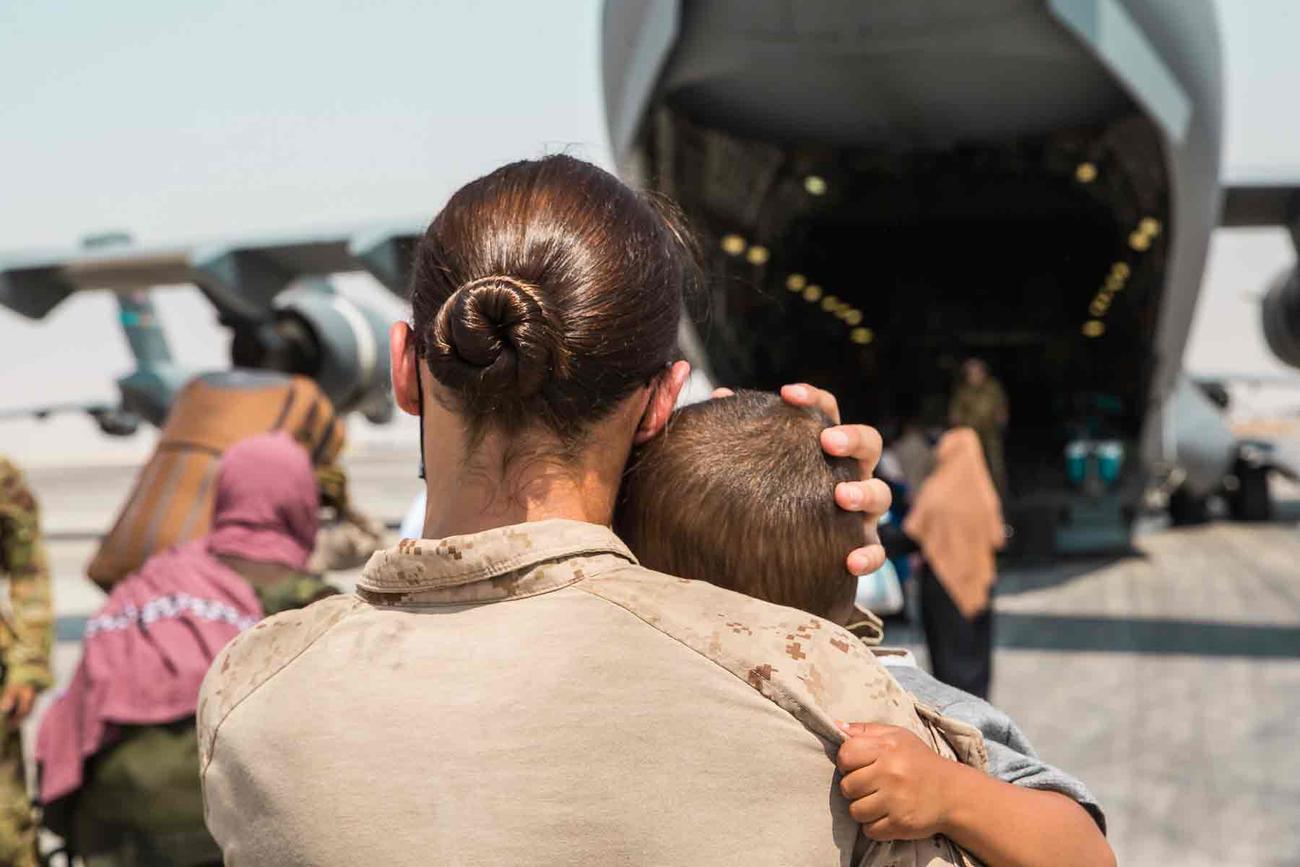
A plan to give Afghans evacuated to the U.S. in 2021 a pathway to getting green cards — a top priority for many veterans since the messy end of the war in Afghanistan — was included in an immigration and foreign aid bill the Senate is considering this week.
The inclusion marks the first time the Afghan proposal has been part of a bill guaranteed to get at least a procedural vote on the Senate floor. But veterans’ joy at the progress of one of their priorities is muted as the larger bill appears headed toward defeat over partisan disputes on immigration policy.
“I don’t love that Afghans are being tied with the border because these are separate issues, and the border’s a political hot potato right now,” said Shawn VanDiver, a Navy veteran and president of the #AfghanEvac coalition, an umbrella organization for hundreds of nongovernmental groups that helped with the evacuation.
Read Next: Some Marines Evacuated over Cockroach Infestation at Camp Lejeune Barracks Facility
“Of course, I’m stoked to see this language in a bill that’s going to get a floor vote,” he added in a phone interview with Military.com. “But the reality is … the Afghan Adjustment Act has the votes to pass if it was put on a stand-alone vote. What it doesn’t have is congressional leadership caring enough about it.”
Veterans have been pushing for nearly two years to get a vote on the legislation, known as the Afghan Adjustment Act, which would create a process for those evacuated to the U.S. during the military withdrawal to become legal permanent residents. The measure also seeks to help Afghans who helped the U.S. military but are still stuck in Afghanistan with reforms to the Special Immigrant Visa program.
Veterans’ efforts to get the proposal attached to a must-pass bill included a round-the-clock protest outside the Capitol building in fall 2022. But despite bipartisan support for the Afghan Adjustment Act, opposition from immigration hard-liners had blocked the measure from being included in any larger legislative package until now.
Most Afghans who were evacuated in 2021 were brought into the country under a temporary legal status known as humanitarian parole. The parole was originally set to expire last year, but because of congressional inaction, the Biden administration is allowing Afghans to apply to extend their parole for up to two more years.
Parole does not provide a pathway to apply for legal permanent resident status, commonly known as green cards. Parolees can apply for asylum, but asylum claims can take years to process under the already taxed U.S. immigration system, leaving Afghans in an indefinite state of limbo.
In addition to those living in that legal limbo, Afghan allies who couldn’t get on an evacuation flight in 2021 remain in danger of retribution by the Taliban.
“Our allies are now paying for their service with bloodshed,” Elizabeth Lynn, a veteran of the Air Force and the Navy Reserve who is now the director of government relations at Operation Recovery, said at a recent roundtable hosted by the House Foreign Affairs Committee.
Lynn described for the committee text messages and videos that veterans have received from Afghan allies documenting public executions, including one instance in which a former Afghan commando was beaten to death with rocks and his brother was forced to drink acid.
“The special operations veteran who received these videos, and who served in Iraq and Afghanistan, describes this retaliation as the most horrific carnage he has seen in his life,” Lynn said. “What will this veteran tell his children when they ask him if they should follow in his footsteps and join the military?”
With the uncertainty and danger Afghan allies are facing, veterans are urging support for the Senate bill that includes provisions of the Afghan Adjustment Act.
“It’s critical that Congress uphold our nation’s word to our Afghan allies and continue to defend democracy across the globe,” Rye Barcott, a Marine Corps veteran and CEO of With Honor Action, a political action committee, said in a statement Monday.
But veterans and Afghans will likely have to continue waiting for the Afghan Adjustment Act to become law.
Despite the Senate bill being negotiated by a bipartisan group, senators now expect a procedural vote scheduled for Wednesday to fail after multiple Republicans came out in opposition to the package because they believe it does not go far enough to crack down on illegal immigration. Even if the bill clears the Senate, House Republican leaders have called the legislation “dead on arrival.”
While failure is likely this time, veterans are vowing to continue the effort to get the bill passed by Congress.
“Advocates for the Afghan Adjustment Act are going to keep pushing and pushing and pushing until it passes, whether it’s in this bill, whether it’s in another vehicle,” VanDiver said. “Congress has abdicated all of their responsibilities. We need to see them take it more seriously.”
Related: ‘We Need Our Voice to Be Heard’: Afghan Resettlement Efforts Unfinished 2 Years After Withdrawal









